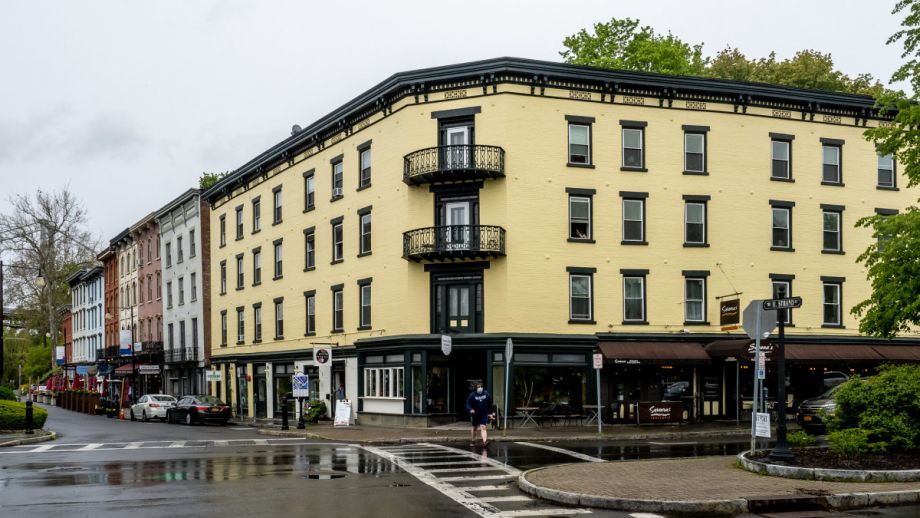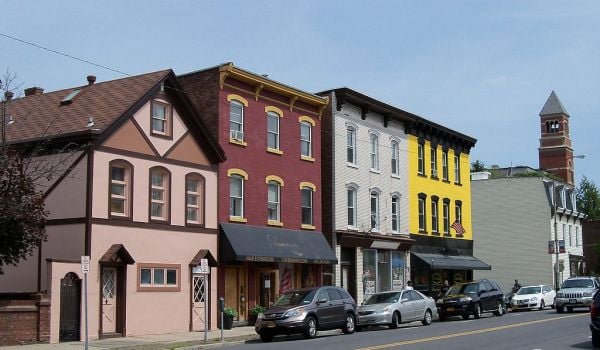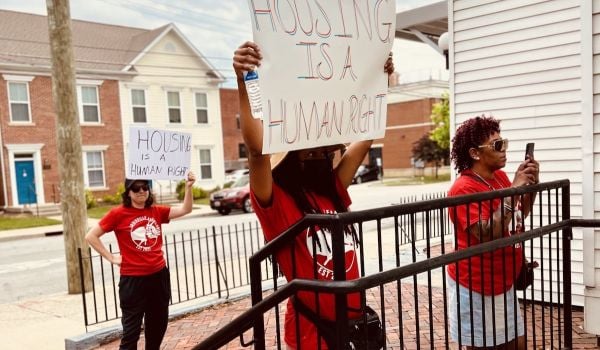Teresa Greene has been living in the Stony Run apartment complex in Kingston, New York, for 14 years. She’s had her share of rent increases, but the last three years have been stark.
Her rent was raised 9% in 2019 for a two-year lease, then 4% after that. Greene was offered a lease with a 11.6% increase this year. If she were to sign it, it would mean a nearly 25% rent increase in three years.
She and her husband currently pay $1,378 for a three-bedroom – $1,403 when she counts the new trash fee the building added. It’s considered a deal to some of the newer residents she’s encountered – transplants from places like Brooklyn and Colorado – but for her and her husband, the situation has slowly become untenable.
If the rent keeps rising at this pace, she says, “I could be very well paying $2,400 a month for rent, which at that point would render me homeless.”
For a week in November, it seemed those dramatic increases would be a thing of the past. This summer, Kingston became the first city in upstate New York to opt into the Emergency Tenant Protection Act, allowing its 64 buildings built before 1974 to be rent-stabilized. (Stony Run is the largest ETPA-covered apartment complex in Kingston.) To opt-in, cities need to prove that the housing stock built before 1974 has a vacancy rate below 5%. A city-initiated survey found a 1.57% vacancy rate.
In November, the city’s newly-formed Rent Guidelines Board voted 6-3 on a 15% rent reduction. In nearly 50 years of the ETPA, New York City has only enacted rent freezes and caps, and no no city in the state has enacted a reduction.
Greene and other tenants had been pushing for this outcome since they formed the Stony Run Tenant Union in August. “We could not allow the landlord to continue to play Russian roulette with our pocketbooks,” says Greene, a member of the union’s organizing committee.
But that rent reduction is in peril, put on hold by an Ulster County Supreme Court judge a week after the vote, the result of a lawsuit by a group of landlords calling themselves the Hudson Valley Property Owners Association. Tenants like Greene are now in limbo as the case winds its way through court.
The landlords argued to the court that the vacancy rate in Kingston is actually above 5% and that the city’s surveys were flawed. They took issue with the city’s methodology - reporting units as having 0% vacancies if landlords did not respond to the survey, an approach permitted under the ETPA. (Landlords do not legally have to respond to the survey and critics argue they have an incentive to falsely report high vacancies.)
“The results of the survey matched some of the anecdotal evidence I’ve been hearing that there are few if any rentals available in the City of Kingston at any given time, so the results were not surprising,” Bartek Starodaj, Kingston’s director of housing told Next City in August.
The landlords said that between July and October 2022, they conducted their own survey with a higher response rate - 100% to the city’s 29% - and got a 6.22% vacancy rate. But none of these responses from landlords were vetted by anyone from the city.
In their letters accompanying their survey, the city stated that they could audit each unit in person to verify landlords’ responses. This detail was meant to address a flaw in a previous vacancy survey conducted by a nonprofit in 2020, which found a 6.7% vacancy rate. As Next City reported in August, that survey had a low response rate, relied on the word of landlords and did not involve in-person verification.
The lower vacancy rate in the city’s survey aligns more with what tenants in the city’s 64 ETPA-covered buildings have been saying for years: They have few options if they are pushed out of their housing.
“There’s nowhere for the tenants to go if they have to move from here,” says Greene of fellow Stony Run residents.
A lawyer for the landlord group also argued that a rent reduction was on its face illegal. The judge paused the rent reduction on Nov. 18 and reaffirmed that decision at another hearing on Nov. 22, appearing to agree with this argument.
“We think the judge was misinterpreting the law, they don’t have a firm grasp of the ETPA and how it works and they kind of just went with the landlord arguments here,” says Aaron Narraph Fernando, a spokesperson for For The Many, a nonprofit advocating in favor of the rent reduction.
Kingston’s Rent Guidelines Board heard from over 70 tenants during two public hearings before voting. Many told harrowing stories of rent increases, lack of repairs, no communication from management and potential displacement. Only six landlords spoke, according to For The Many.
One property owner who spoke at the Oct. 25 hearing said that any rent increases should be blamed on taxes paid to the city of Kingston and Ulster County. He suggested a trust fund for tenants and landlords. But a tenant, Charles Sanchis, responded that it was too late to implement a trust fund and more radical measures were needed, as many tenants have already lost their homes.
Yet another tenant named Chanel Marshall testified that a new owner bought her building and immediately evicted her and her two children without giving them time to find a new place. “I don’t think that’s totally fair how people are coming up here and buying our properties and just saying get out,” she said. “We have rights too.”
While tenants are waiting for the judge’s decision, they’re working on filing fair market rent appeals to contest the base rent that landlords filed when Kingston opted into the ETPA. Many tenants saw rent hikes in 2019 when the Housing Stability and Tenant Protection Act expanded the scope of the ETPA, which had previously only covered New York City and its suburbs.
Tyler Vanderhaag, Hudson Valley organizer with Citizen Action, says the group has been focused on helping tenants fill out these rent appeals while the court decides on Kingston’s rent stabilization status. Some tenants have been confused by the ongoing litigation, but Vanderhaag stresses that people living in one of the 64 ETPA buildings in Kingston can not be evicted as the case winds its way through court.
“The landlords and then the judge with his decision has really just made this process even more complicated for tenants,” he says.
Greene believes her recent rent increases have a lot to do with an influx of downstate residents, a result of the owners’ marketing campaign. Stony Run’s website says tenants can enjoy the “tranquility of Kingston while you lounge by the pool or explore the newly renovated clubhouse.” It provides stunning photos of spacious bedrooms, shimmering floors and bucolic white walls, framed by modern art and carefully arranged minimalist furniture.
“That’s their marketing. And it is so not that,” Greene says. Some of the amenities were illusory: The pool has been closed for years, she says. A promised gym is still under construction. The owners even had to concede to removing a $65 amenities fee after residents complained.
In the past few months, Greene has met several downstate newcomers, and she noted that their earning power seemed higher than hers when they told her how much they paid in rent.
“Our economics don’t match New York City’s economics,” she says. “If you got the money, and you can do that, that’s fine. But for those of us who’ve been here for a while, this is our home. We don’t want to get pushed out of our homes.”
Greene is steadfast that a rent reduction will remain in place, and sees it as vital for staying in her home. “I get that (landlords are) going to push against it because it’s money in their pockets,” she says. “At the end of this process, there will be a rent reduction.”
This article is part of Backyard, a newsletter exploring scalable solutions to make housing fairer, more affordable and more environmentally sustainable. Subscribe to our weekly Backyard newsletter.

Roshan Abraham is Next City's housing correspondent and a former Equitable Cities fellow. He is based in Queens. Follow him on Twitter at @roshantone.


















